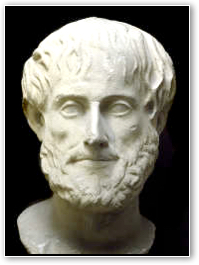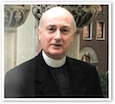"Happiness is no laughing matter"
- FATHER GEORGE W. RUTLER
Since Arturo Toscanini lived to be nearly 90, dying in the Bronx, I was able as a boy to watch an orchestra conducted by the man who led the premiere of Pagliacci in 1892.
 In operas like that and Otello, divas never have a better chance to hit a high E-flat than when they are being strangled or stabbed. It is said that Pope Benedict XV's last words in 1922 were the same as in Leoncavallos' opera after Nedda and her lover Silvio are slain: "La commedia è finita!" Lest one think that the pope's domestic life was unruly, the line was first used at the end of Haydn's more decorous opera, Il Mondo della Luna. Anti-Catholic polemicists, whose less than rudimentary Italian imputes cynicism to the pope, infer from this that his reign and the papacy itself were a farce. If the pope did say what was claimed, he spoke of "commedia" as did Dante: the drama of the pope's life was ending, and he had fulfilled the work assigned him. It was a happy ending, though the world around him had passed through a terrible sadness of war.
In operas like that and Otello, divas never have a better chance to hit a high E-flat than when they are being strangled or stabbed. It is said that Pope Benedict XV's last words in 1922 were the same as in Leoncavallos' opera after Nedda and her lover Silvio are slain: "La commedia è finita!" Lest one think that the pope's domestic life was unruly, the line was first used at the end of Haydn's more decorous opera, Il Mondo della Luna. Anti-Catholic polemicists, whose less than rudimentary Italian imputes cynicism to the pope, infer from this that his reign and the papacy itself were a farce. If the pope did say what was claimed, he spoke of "commedia" as did Dante: the drama of the pope's life was ending, and he had fulfilled the work assigned him. It was a happy ending, though the world around him had passed through a terrible sadness of war.
Aristotle's concept of happiness as the goal of life is different from run-of-the-mill notions of feeling satisfied. His eudaimonia is the serenity that comes from a virtuous life lived with balance and dignity. The Oxford professor of rhetoric and logic, Richard Whately, a mentor of John Henry Newman, summed this up in the line often mocked by those who lack subtlety: "Happiness is no laughing matter."
There are different kinds of laughter, and another professor, Ronald Berk (biostatician emeritus of Johns Hopkins University), has categorized them: snicker, giggle, chuckle, chortle, laugh, cackle, guffaw, howl, shriek, roar and convulsion. You can see how they gradually degenerate from Aristotelian serenity. One must be suspicious of the media cynosure, rampant in politics and such, who laughs habitually, with the same pose and bluster. I do not mean the mad man who laughs at what is not funny, but the calculator who laughs for effect: sometimes out of insecurity and often to ingratiate and manipulate, a clown outside and a cad inside. It is the sardonic impulse of one who does not want the people on deck to see the looming iceberg, or who cajoles you into buying the Brooklyn Bridge.
The Lady of Lourdes told Saint Bernadette: "I promise you happiness not in this world, but in the other." The Lady did not laugh, but bestowed on Bernadette a smile that she keeps today in realms above. And the Lady's son is not recorded as guffawing (although his amiable fraternity was like none other), but he came that our joy might be full. "These things I have spoken to you, that in me you may have peace. In the world you shall have distress; but have confidence, I have overcome the world" (John 16:33).
 This is Meaghen Gonzalez, Editor of CERC. I hope you appreciated this piece. We curate these articles especially for believers like you.
This is Meaghen Gonzalez, Editor of CERC. I hope you appreciated this piece. We curate these articles especially for believers like you.
Please show your appreciation by making a $3 donation. CERC is entirely reader supported.

Acknowledgement
 Father George W. Rutler. "Happiness is no laughing matter." From the Pastor (November 15, 2015).
Father George W. Rutler. "Happiness is no laughing matter." From the Pastor (November 15, 2015).
Reprinted with permission of Father George W. Rutler.
The Author
 Father George W. Rutler is the pastor of St. Michael's church in New York City. He has written many books, including: The Wit and Wisdom of Father George Rutler, The Stories of Hymns, Hints of Heaven: The Parables of Christ and What They Mean for You, Principalities and Powers: Spiritual Combat 1942-1943, Cloud of Witnesses — Dead People I Knew When They Were Alive, Coincidentally: Unserious Reflections on Trivial Connections, A Crisis of Saints: Essays on People and Principles, Brightest and Best, and Adam Danced: The Cross and the Seven Deadly Sins.
Father George W. Rutler is the pastor of St. Michael's church in New York City. He has written many books, including: The Wit and Wisdom of Father George Rutler, The Stories of Hymns, Hints of Heaven: The Parables of Christ and What They Mean for You, Principalities and Powers: Spiritual Combat 1942-1943, Cloud of Witnesses — Dead People I Knew When They Were Alive, Coincidentally: Unserious Reflections on Trivial Connections, A Crisis of Saints: Essays on People and Principles, Brightest and Best, and Adam Danced: The Cross and the Seven Deadly Sins.




